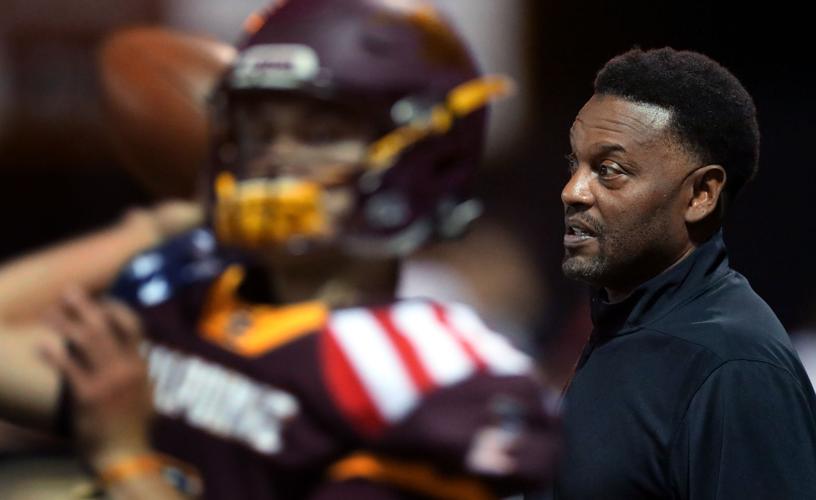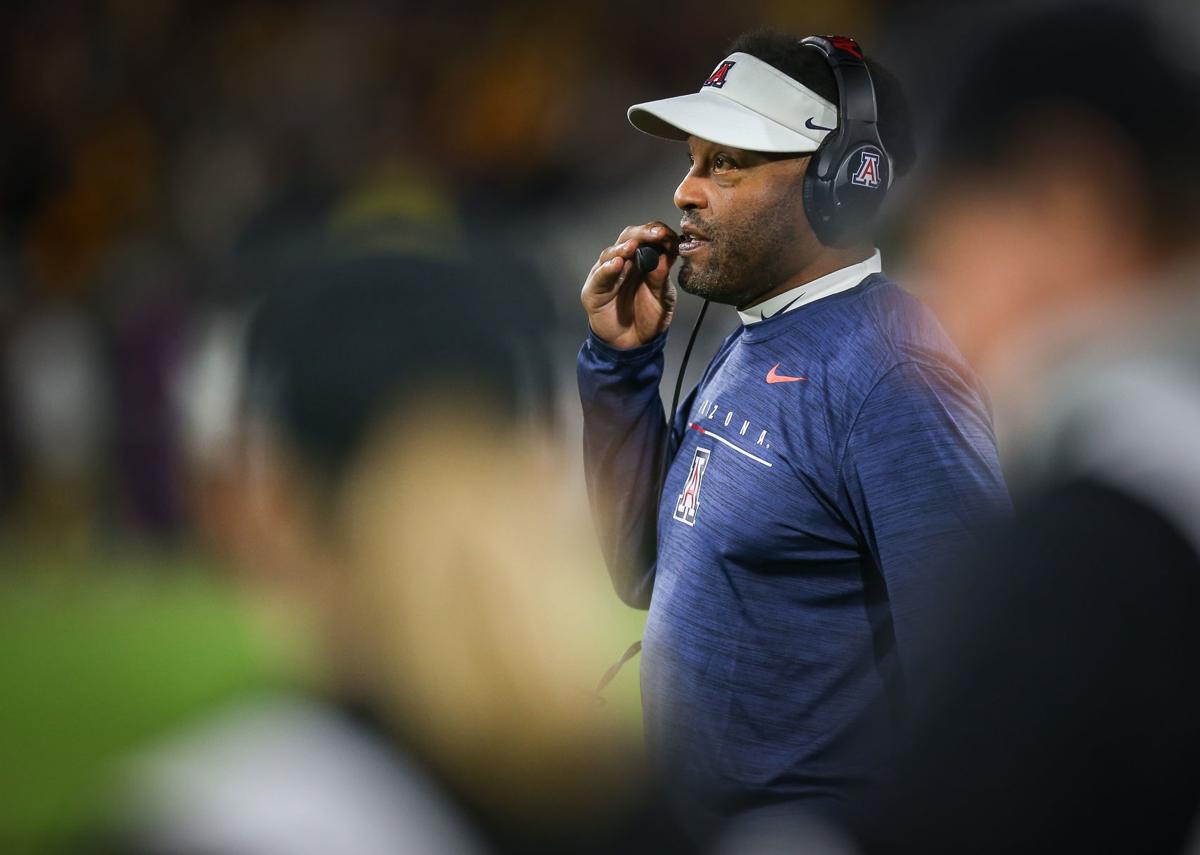At his introductory news conference in January 2018, the first question Kevin Sumlin received was a familiar one:
How significant is it to you to be the first black head football coach at this university?
The newly minted coach of the Arizona Wildcats had answered some variety of that query two previous times. He was the first black head coach at Houston. He was the first black head coach at Texas A&M.
The question didn’t come until the final minutes of Sumlin’s introduction in College Station. Part of his response consisted of this appeal:
“Hopefully, in the next five years or so, that won’t even be a discussion.”
Sumlin made that statement on Dec. 12, 2011. Eight-plus years later, it’s still a relevant topic.
The most recent hiring cycle for head coaches in FBS and the NFL was not favorable for minority candidates — especially African Americans. Among the 27 coaches who were hired, only five were minorities. Among those five, only two were African Americans: Jimmy Lake at Washington and Willie Taggart at Florida Atlantic.
(The Michigan State job came open this past week after Mark Dantonio, who is white, resigned. Colorado coach Mel Tucker, who is black, reportedly was a candidate but withdrew from consideration.)
Among the 130 coaches in FBS, only 13 are black — or 10%. In 2012, Sumlin’s first year at Texas A&M, African-Americans held 17 of 120 FBS head-coaching jobs, or 14%.
The most recent NCAA data, from 2018, shows that blacks represented 49.2% of the player population. In 2012, that figure was 48.1%.
“Those numbers don’t lie,” Sumlin told the Star during an hourlong interview in his office at the Lowell-Stevens Football Facility. “There’s an issue. It’s disappointing.”
College football doesn’t have a commissioner to address the issue. The NFL — where only four of 32 head coaches are minorities — does.
At his annual address at the Super Bowl last week, NFL Commissioner Roger Goodell commented on the Rooney Rule, a mandate to interview at least one minority candidate for NFL head-coaching positions that went into effect in 2003. Entering the 2020 season, the league has the same number of African American head coaches — three — as it had then.
“It’s clear we need to change and do something different,” Goodell said.

University of Arizona head football coach
The Rooney Rule was named after the late Dan Rooney, former owner of the Pittsburgh Steelers. In 2007, Rooney hired Mike Tomlin, an African American, who led Pittsburgh to a Super Bowl title two years later and is the third-longest-tenured coach in the league.
Tomlin’s success has not spurred a surge in minority hiring, at least not a sustained one. There are no simple solutions to the ongoing problem of underrepresentation, but Sumlin does feel a responsibility to do his part — by winning. The way he sees it, he isn’t just coaching for his school, his team, his family or himself.
“Everybody’s got pressure at this level to succeed,” Sumlin said. “What you want to do is have success so that it makes it easier for people who look like you to be in these roles.”
Although the Wildcats have struggled under his leadership, Sumlin has been a trailblazer for black coaches. He isn’t the first member of his family who can make that claim.
Segregated South

Arizona head coach Kevin Sumlin and his bench try to get their message across to the defense during a drive by Texas Tech in the first quarter of their football game at Arizona Stadium, Tucson, Sept. 14, 2019.
William Sumlin Jr.’s first coaching job came as an assistant at a high school in Milton, Florida. There, he met his future wife, Marion, who was the librarian at the school.
The Sumlins would move 35 miles north to his hometown, Brewton, Alabama, where William became the football and basketball coach at Booker T. Washington High School. Although the U.S. Supreme Court had ruled segregation in public schools unconstitutional seven years earlier, in 1954, the practice persisted in the Deep South. Booker T. Washington was an all-black school, and that fact presented plenty of challenges for Kevin Sumlin’s father.
The most frequently told story involved a return trip from a basketball tournament. Only one restaurant remained open in Brewton when the team got home. It had a “White Only” sign on the front door. William Sumlin and his team were denied service until the Brewton police chief intervened on their behalf.
“He couldn’t feed them,” Kevin Sumlin said. “That was extremely frustrating for him.”
It wasn’t the first time William Sumlin had experienced discrimination.
He spent part of his youth living in Northern California, where his father helped build ships during World War II. The family eventually returned to Brewton, traveling by train.
“They were coming back to Alabama, and somewhere they had to move to the back of the train,” Kevin Sumlin said. “He didn’t understand that, growing up in California.
“And when they get back there, he didn’t understand the water-fountain situation or not being able to go places. He went to get some ice cream, and they wouldn’t serve him.”
William Sumlin died in 2016 at the age of 80. Marion Sumlin, who’s 85, recalled that “there were certain places you couldn’t go” in Brewton, Alabama, in the early 1960s.
“If you went to the theater,” she said by phone Friday, “you had to sit in the balcony.”
Marion gave birth to Kevin on Aug. 3, 1964, in the “colored” wing of a local hospital. It was the first day of practice for William’s football team. It was also the year during which the Civil Rights Act was passed.
Two years later, William attended summer school at Indiana University in pursuit of his master’s degree. Marion, an elementary school teacher, was offered a job in Indianapolis. Her starting salary was greater than what she and her husband made combined back home.
The Sumlins realized Central Indiana had more to offer to young black professionals than Southern Alabama. They also wanted to put Kevin in the best possible situation to succeed.
The Sumlins’ lives improved, but they still encountered familiar problems from time to time.
While looking for an apartment near the school where Marion would be working, they saw a building with a vacancy sign. William entered to inquire about the unit.
“We don’t have any vacancies for you,” he was told.
The Sumlins taught their son to handle difficult situations like that diplomatically, or to at least try to. Kevin saw his father carve out a prosperous career as a school administrator and marveled at how he “dealt with a lot of different things” and never seemed to hold grudges.
Kevin excelled in multiple sports, especially basketball. Many of his teammates and friends were white.
He rarely got in trouble, although he did get kicked out of a summer camp in junior high for fighting. Sumlin wouldn’t disclose any intimate details of the incident but did say his parents weren’t upset with him after he told them what happened.
“Sometimes people,” Sumlin said, “you can’t change their mind.”
It takes time. Sumlin’s childhood friend, Walter Lewis, who’d hang out with Sumlin every summer in Brewton, put it this way: “It takes a while when attitudes are sewn into people. It takes a generation or two of doing things differently to really get it out of their system.”
Building a network

Arizona coach Kevin Sumlin has landed 20 recruits for the 2021 recruiting class, but just one — Canyon del Oro High School’s Stevie Rocker — hails from Arizona.
In September 2017, after Texas A&M blew a big second-half lead against UCLA, Sumlin received a threatening letter at his home.
The writer — a man named Robin Chiswell, who’d later be arrested on stalking charges from separate cases — called Sumlin a racial slur and urged him to “get out or else.” The incident traumatized Sumlin’s then-wife, Charlene, and their four children.
“Anything of a threatening nature that comes to your house becomes an extreme concern when you have a wife and kids,” Sumlin said.
The Sumlins received support from A&M officials and local law enforcement. They were shaken, but they felt safe.
Marion Sumlin always worried about her son while he worked in Texas, especially when recruiting trips took him to rural outposts. When he first began to drive, back in Indianapolis, she advised him to keep his hands where police officers could see them if he ever got pulled over.
Texas A&M fired Sumlin in late November of ’17 after a fourth consecutive five-loss season. He landed the Arizona job about a month and a half later.
Sumlin was fortunate. Data suggests that black coaches are less likely to get second chances than their white counterparts.
Sumlin carries that burden as he enters a pivotal Year 3 with the Wildcats. A common sentiment among minorities, especially in a highly competitive field like coaching, is that they have to do more to get and keep desirable jobs.
“My dad told me that a long time ago,” said Marvin Lewis, the co-defensive coordinator at Arizona State and former head coach of the Cincinnati Bengals. “Whatever I do, I have to be twice as good.”
Lewis coached the Bengals for 16 seasons, from 2003-18. He joined ASU’s staff last year as a special advisor to Herm Edwards, one of four African American coaches hired by Pac-12 schools in the past three cycles.
The conference leads the nation with five black head coaches. The fifth, Stanford’s David Shaw, is the son of Willie Shaw, a longtime assistant coach whom Lewis considers a mentor.
Lewis said part of the reason Edwards hired him was to mentor the younger coaches on ASU’s staff, regardless of color. They include Antonio Pierce, who is black and is sharing the DC duties with Lewis. In that way, Lewis is paying it forward.
Like Sumlin, Lewis expressed disappointment about the lack of progress for African American coaches. He is hopeful he and others can build a network of viable candidates, especially in the coordinator ranks, from which new head coaches often are drawn.
Sumlin has witnessed the power that sort of network can have … in his once-segregated birthplace of Brewton, Alabama.
“As I got older, it changed,” Sumlin said. “My grandfather became a city councilman. That would have never happened. I mean, never.
“A lot of people that were his friends (became) lawyers, bankers, real-estate people. Their sons, their families are still there running businesses.”
Walter Lewis would become an investment banker in Birmingham — but not before becoming the first black starting quarterback at the University of Alabama. African American QBs are now commonplace. Lamar Jackson is the reigning NFL MVP. Patrick Mahomes is a Super Bowl champ.
The ethnicity of quarterbacks is rarely discussed anymore. The coaching profession isn’t quite there yet.
“You’ll know progress has been made,” Sumlin said, “when the first or second question at the press conference is not about race.”








